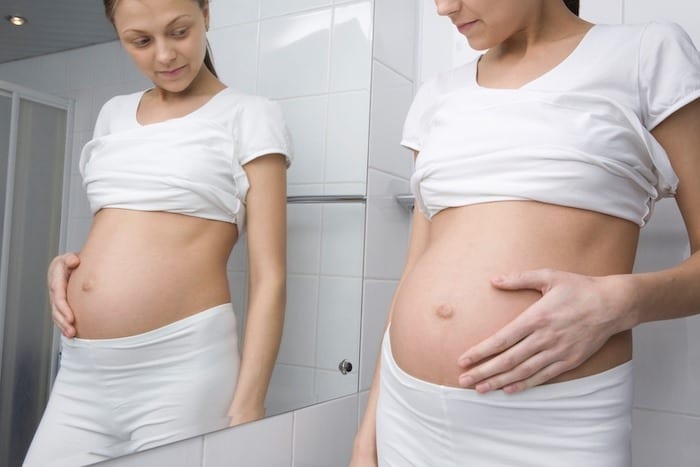
There are few experiences that are as heartbreaking as a pregnancy that ends with a miscarriage within the first trimester. Also known as a spontaneous abortion, the term ‘miscarriage’ refers to a pregnancy that ends naturally on its own before the 20 week gestation period. The exact cause of a miscarriage varies from woman to woman, but can some foods, chemicals or even activities increase the chances of a miscarriage?
Most women feel as though they made a mistake during the pregnancy, and it caused an early natural termination of the pregnancy. This feeling can lead to guilt, depression and other health issues. However, in the majority of cases, the miscarriage was simply a random event without a specific reason.
The Signs Of A Miscarriage or Spontaneous Abortion
One of the most common signs of a miscarriage is bleeding. However, almost 25% of women of have experienced light vaginal spotting during their first trimester. This is not unusual, and is certainly not a definite sign of a miscarriage.
The risk of a miscarriage does increase if the bleeding is heavy. It is at this point, women should schedule an appointment with their practitioner as soon as possible. Other signs and symptoms of a first trimester miscarriage are:
Cramping
The passing of tissue or fluid out of the vagina
During the miscarriage, the bleeding will become heavier and the cramps will become more intense. You should seek immediate medical help if you are at risk of a tubal(ectopic) pregnancy. Women who are at risk of an ectopic pregnancy are those with previous infertility issues, IUD use and previous pelvic infections. Always remember that ectopic pregnancies are life-threatening medical emergencies.
Sadly, there is little that can be done after a miscarriage begins. Most women just allow their bodies to complete the process on its own. A miscarriage can end in a matter of hours, or it may take a few days.
So, with that said, are there any foods, chemicals or activities that can increase a woman’s risk of having a miscarriage?
Foods And Beverages To Avoid Eating While Pregnant
When a woman finds out she is pregnant at a clinic like PRCCharlotte.com, she wants to ensure she is providing her unborn child with the proper nutrients. There are some foods and drinks that women know to avoid such as alcohol, but there are some other foods that are linked to stillbirths and miscarriages that pregnant women may not be aware of.
Pregnant women should avoid eating and drinking milk that are not pasteurized. It is easy to avoid these types of products because they are generally labeled ‘unpasteurized’ or ‘raw’.
Pregnant women should also avoid eating soft cheeses because they are at risk of being contaminated with Listeria. Avoid these cheeses unless you are certain they were made from pasteurized milk:
Feta
Brie
Ricotta
Queso
Camembert
There are also meat products that should be avoided during pregnancy. Processed meats like deli meats, sausages, hot dogs, cold cuts and smoked seafood should not be eaten unless they are reheated to 170 degrees F and eaten immediately.
It is also a good idea to avoid eating any unwashed produce. Listeria is present in the soil, and vegetables should be thoroughly washed in order to avoid illness and miscarriage.
Pineapples are one of the most dangerous fruits a pregnant woman can eat. Pregnant women should avoid the fruit and its juice during the first trimester.
Pineapples are dangerous because they contain bromelain. This enzyme causes contractions and softening of the uterus.
Chemicals To Avoid During Pregnancy
Regular chemical exposure has been proven to increase the likelihood of a miscarriage. In fact, there is one classification of chemicals that have been found to cause stillbirths, miscarriages and disruptions in fetal development.
These chemicals are referred to as teratogens, and they can be found in radiation, toxic chemicals and even in alcoholic beverages and tobacco smoke.
The effects of these chemicals on pregnant women vary. Some women experience no negative effects, while other women give birth to babies with birth defects. Still, other women suffer from stillbirths, neonatal deaths or miscarriages.
In addition to a mother’s exposure to these chemicals playing a role in miscarriage, the father’s exposure to teratogens may also play a role in the likelihood of a miscarriage. Some of the other chemical agents that can cause a miscarriage are:
Heavy metals
Glycol ethers
Anesthetic gases
Petrochemicals
Ethylene oxide
Physical Activities To Avoid During Pregnancy
Over the years, doctors have encouraged women to exercise while pregnant. However, Danish studies published in 2007 discovered that high intensity or strenuous exercise before the 19th week gestation period can increase the risk of a miscarriage. So, what did these researchers find out?
They found a correlation between the amount of time a woman worked out each week and the chance of miscarriage. The study also looked at the effect of HIIT had on miscarriage.
Women who exercise more intensely were 3 times as likely to have a miscarriage when compared to women who did not work out at all during their pregnancy. The women who exercised participated in activities such as jogging, tennis and ball games.
Doctors and other medical experts can not pinpoint a direct cause as to why some women have completely healthy, full term pregnancies, while others suffer with miscarriages. However, there are some preventative measures that women can take by watching what they eat, the activities they participate in and avoiding toxic chemicals to increase their chances of a full-term pregnancy.
